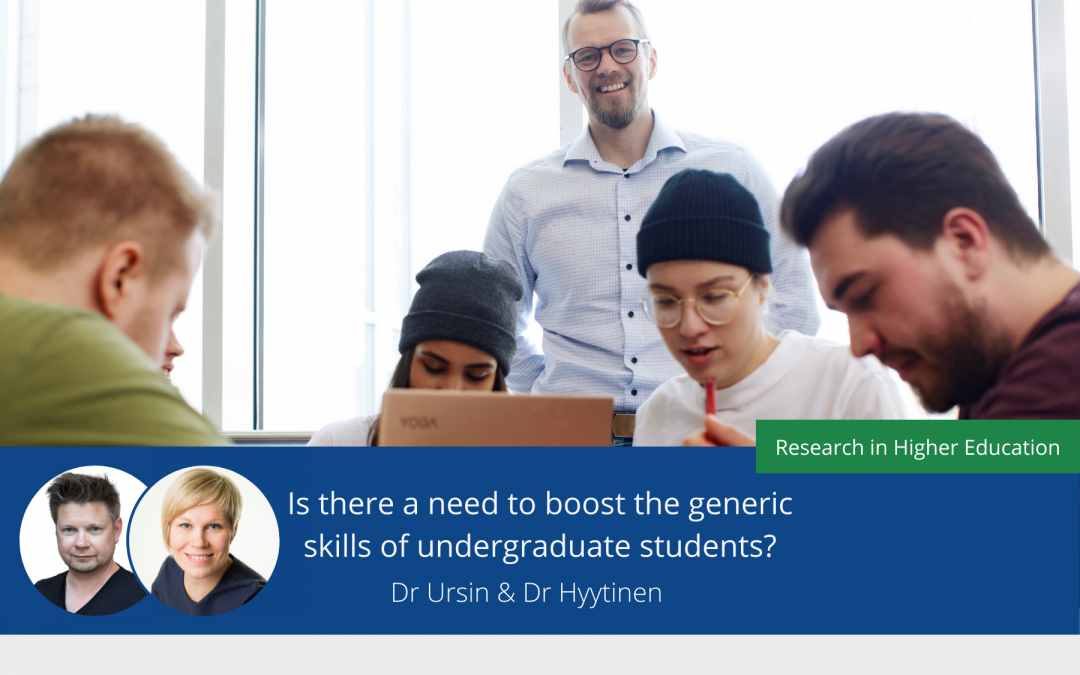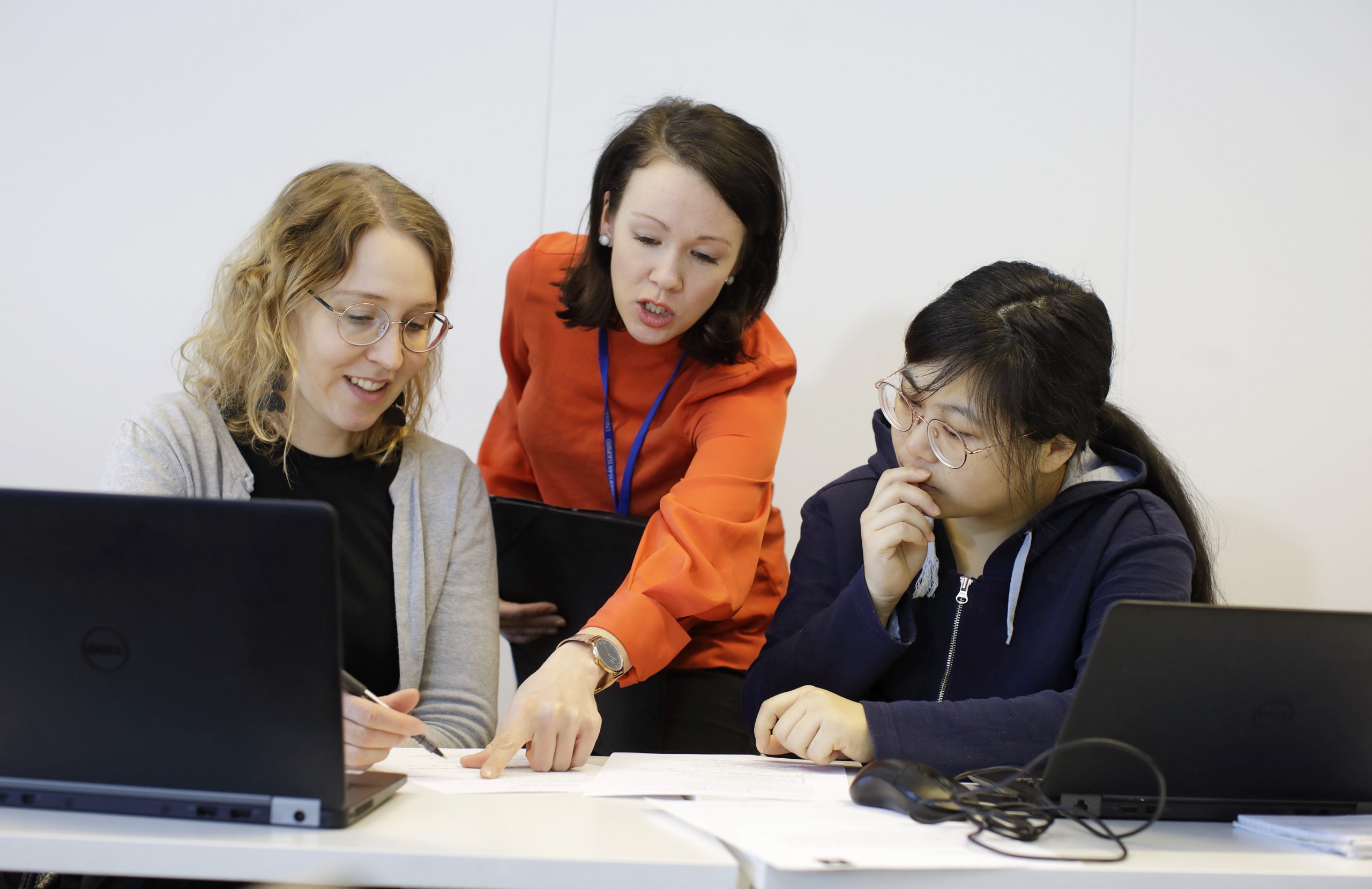
Is there a need to boost the generic skills of undergraduate students?
‘Climate change is not caused by humans, and it does not pose any threat to humans or the environment.’
Although there is widespread agreement among scientists that global climate change is real, and is caused by human activity, we often see and hear assertions of this kind. How can we differentiate between what is true and what is not, in an age when we are surrounded by real-time news – and “fake news” – distributed by traditional and new media?
This is where generic skills come into play. The list of generic skills is long, ranging from interaction skills to intercultural skills, and from leadership skills to emotional skills (Barrie, 2012; Tuononen et al., 2019; Virtanen & Tynjälä, 2018). In higher education, generic skills typically refer to higher-order cognitive skills such as critical thinking, and the ability to solve complex problems (Halpern, 2014). However, generic skills are important in all domains of life. Together with subject knowledge, generic skills help people to navigate daily life (Arum & Roksa, 2011; Hyytinen et al., 2019). They are also a means for continuous learning, and ultimately, for becoming informed global citizens.
Educational choices and growth environments matter

Photographer: University of Jyväskylä’
Our study on generic skills among Finnish undergraduate students (Ursin, Hyytinen & Silvennoinen, 2021) found that students showed substantial variation in the mastery of generic skills. Some undergraduate students displayed high levels of generic skills, and others had only a limited command of them. The differences seemed to be explained by factors in the students’ educational and socioeconomic background: undergraduate students with general upper secondary education, and whose childhood environment had encouraged reading, seemed to have the highest command of generic skills. Conversely, students with a vocational upper secondary qualification and whose early environment had supported less reading tended to have weaker generic skills. The findings highlight the benefits of a growth environment which foregrounds a culture of learning and reading.
To reach every citizen, generic skills should be taught from a very early age, and in various learning environments, but the improvement of generic skills should continue into undergraduate studies and beyond.
Enhancing generic skills in higher education

Photographer: University of Jyväskylä’
The life that one has lived does matter. Yet much can be done during higher education to enhance generic skills (e.g., Heijtjes et al., 2014; Hyytinen et al., 2019; Virtanen & Tynjälä, 2018). They do not differ from any other skills: generic skills can be learned if they are actively practiced, comprehensively built into undergraduate programmes, and vigorously supported in teaching and learning.
It is important to bear in mind that there is no easy, one-size-fits-all solution or detailed step-by-step guidelines on how to improve generic skills in undergraduate studies. Conversely, the entire teaching-learning environment needs to be rethought and redesigned so that it better contributes to the development of generic skills. The learning of generic skills requires support, continuous feedback to students, and a combination of theory and practice in multiple course contexts (Virtanen & Tynjälä, 2018). Learning occurs when the teaching of generic skills is explicitly embedded in several courses throughout the curriculum, along with feedback to students on how to improve and build their skills. Otherwise, the topic runs the risk of remaining incidental or isolated (e.g. Hyytinen at al., 2019; Jääskelä, Nykänen & Tynjälä, 2018).
Unfortunately, higher education teachers are not necessarily well prepared to teach and assess generic skills – or not in a way that best supports the development of the skills (Barrie, 2012; Mah & Ifenthaler, 2017). Teachers need a clear understanding of what generic skills are and why they are essential. In order to develop generic skills in their students, teachers need support in gaining pedagogical competencies that will enable them to integrate the elements of generic skills in their teaching and assessment practices (Hyytinen et al., 2019; Jenert, 2014).
Implementation of generic skills in higher education is a joint effort
Successful implementation of generic skills in study programmes requires an active interplay between leaders, teachers, and students in higher education:
- Leaders of higher education institutions must recognize the importance of generic skills in study programmes and provide support for teachers and students.
- Teachers in higher education institutions must see generic skills as equally important as the subject they teach; hence, they must be willing to include generic skills in their teaching and assessment (Hyytinen et al., 2019; Virtanen & Tynjälä, 2018).
- Students need to take responsibility for their own learning; hence, they must be willing to invest time and effort in the development of generic skills (Arum & Roksa, 2011; Evens et al., 2013).
Featured Image: Photographer: University of Jyväskylä’
Other blog posts on similar topics:
References and Further Reading
Arum, R., & Roksa, J. 2011. Academically adrift: Limited learning on college campuses. Chicago: University of Chicago Press. https://press.uchicago.edu/ucp/books/book/chicago/A/bo10327226.html
Barrie, S. C. (2012) A research-based approach to generic graduate attributes policy, Higher Education Research & Development, 31:1, 79-92, doi:10.1080/07294360.2012. https://www.tandfonline.com/doi/abs/10.1080/07294360.2012.642842
Evens, M., Verburgh, A. & Elen, J. 2013. Critical thinking in college freshmen: The impact of secondary and higher education. International Journal of Higher Education 2(3), 139-151. https://www.sciedupress.com/journal/index.php/ijhe/article/view/3002/1876
Halpern, D. F. 2014. Thought and knowledge: An introduction to critical thinking. New York, London: Psychology Press. https://doi.org/10.4324/9781315885278
Heijtjes, A., van Gog, T., Leppink, J. & F., Paas, F. 2014. Improving critical thinking: Effects of dispositions and instructions on economics students’ reasoning skills. Learning and Instruction 29, 31-42. http://dx.doi.org/10.1016/j.learninstruc.2013.07.003
Hyytinen, H., Toom, A., & Shavelson, R. J. (2019). Enhancing scientific thinking through the development of critical thinking in higher education. In M. Murtonen, & K. Balloo (Eds.), Redefining Scientific Thinking for Higher Education: Higher-Order Thinking, Evidence-Based Reasoning and Research Skills (pp. 59-78). Palgrave Macmillan. https://researchportal.helsinki.fi/files/130928289/Enhancing_Scientific_Thinking_Through_the_Development_of_Critical.pdf
Jenert, T. (2014). Implementing-oriented study programmes at university: The challenge of academic culture. Zeitschrift für Hochschulentwicklung, 9(2), 1–12. Retrieved from https://www.alexandria.unisg.ch/publications/230455
Jääskelä, P., Nykänen, S. & Tynjälä, P. 2018. Models for the development of generic skills in Finnish higher education. Journal of Further and Higher Education 42(1), 130-142. https://doi.org/10.1080/0309877X.2016.1206858
Mah, D-K. & Ifenthaler, D. (2017). Academic staff perspectives on first-year students’ academic competencies. Journal of Applied Research in Higher Education, 9 (4), 630-640. doi: 10.1108/JARHE-03-2017-0023. https://www.deepdyve.com/lp/emerald-publishing/academic-staff-perspectives-on-first-year-students-academic-WMDLFmRY8t?impressionId=5d089ad426048&i_medium=docview&i_campaign=recommendations&i_source=recommendations
Tuononen, T., Parpala, A. & Lindblom-Ylänne, S. (2019). Graduates’ evaluations of usefulness of university education, and early career success – a longitudinal study of the transition to working life. Assessment & Evaluation in Higher Education, 44(4), 581-595. https://doi.org/10.1080/02602938.2018.1524000
Ursin, J., Hyytinen, H. & Silvennoinen, K (eds.). 2021. Assessment of undergraduate students’ generic skills in Finland: Findings of the Kappas! project. Publications of the Ministry of Education and Culture, Finland 2021:31. http://urn.fi/URN:ISBN:978-952-263-901-1
Virtanen, A. & Tynjälä, P. 2018. Factors explaining the learning of generic skills: a study of university students’ experiences. Teaching in Higher Education, 24 (7), 880–894. https://doi.org/10.1080/13562517.2018.1515195.

Dr Jani Ursin
Senior Researcher at the Finnish Institute for Educational Research, University of Jyväskylä, Finland
Dr Jani Ursin is a senior researcher at the Finnish Institute for Educational Research, University of Jyväskylä, Finland. His research has focused on academic work, the assessment of higher education learning outcomes, mergers of higher education institutions, and quality assurance in higher education. He is a former Link Convenor of EERA Network 22 (Research in Higher Education), after which he represented all the networks on the EERA Council. His profile is at: https://ktl.jyu.fi/en/staff/ursin-jani

Dr Heidi Hyytinen
Senior Lecturer in University Pedagogy at the Centre for University Teaching and Learning, University of Helsinki, Finland
Dr Heidi Hyytinen is a senior lecturer in university pedagogy at the Centre for University Teaching and Learning, University of Helsinki, Finland. Her research interests include performance-based assessment, generic skills, critical thinking, self-regulation, and pedagogy in higher education. Her profile is at: https://researchportal.helsinki.fi/en/persons/heidi-hyytinen
